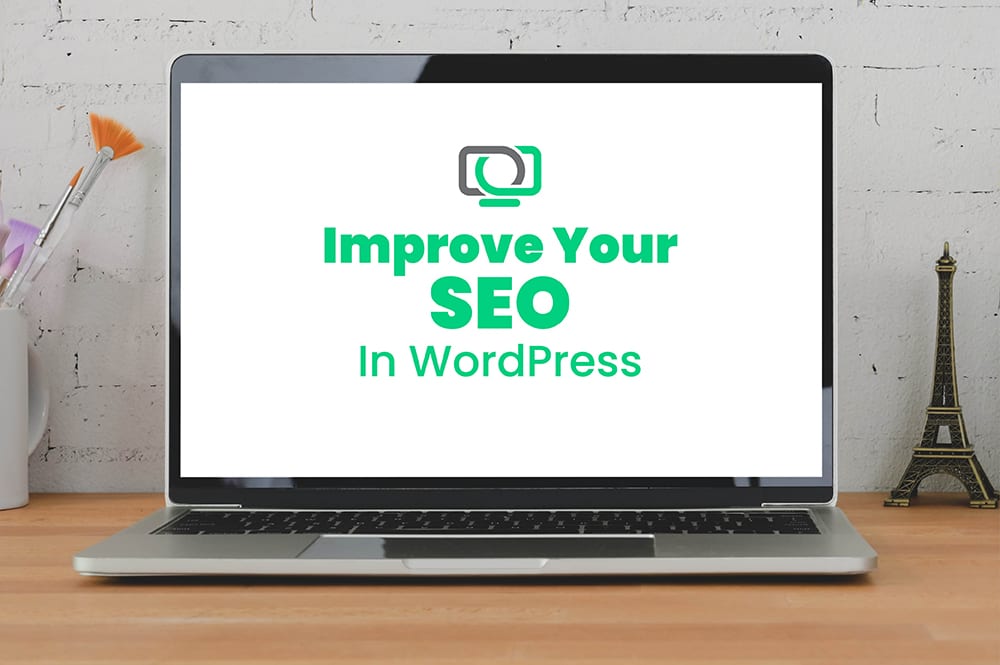
Summarizing SEO in under one-thousand words is no easy feat, and it doesn’t get any easier if we’re talking about improving SEO in WordPress. But, we’re going to give it a shot in this article as we consider the basics on how to improve WordPress SEO. From the most practical steps such as conducting research and observing your competitors to the more advanced aspects such as plugins and the notorious “black hat” SEO method, you can conquer the basics of WordPress SEO.
To start, there are four key points to consider when it comes to improving WordPress SEO. Consider the following steps to take when preparing for conducting SEO on your WordPress website. With these four steps in mind, we can begin to improve our WordPress SEO immediately:
- Research
- Competition
- Content
- Keywords, phrases, and descriptions

Do your research:
The first and most important part of developing your SEO for WordPress is doing your research! Research involves more than just browsing the web; you need to figure out what keywords and phrases will be used in your website content and SEO to ensure you are implementing all the primary points as regards to organic search engine optimization.
Observe your competition:
What is your competition doing for SEO marketing online, organic paid ads, and the like to get their website noticed? It’s important that you aim to figure out who’s winning on the Google homepage (websites that appear on the first page of a Google search) and how they’re winning so that you can then apply some of those principles toward improving your WordPress SEO.
Create your content:
If you’re looking to optimize your website for search engines, you’ve probably already created your website content, or your website is likely already designed with your text and images in place. Keep in mind that if this is the case, you likely might have to do some alterations to the existing content on the page in order to accommodate your SEO plan. As such, being open and aware of the latter is very important.
Developing your keywords and phrases:
Part of the research that was mentioned previously is being able to look at your keywords, phrases, and page descriptions and understand what you’re trying to optimize. Keywords, phrases, and page descriptions are cornerstones when it comes to your SEO preparation and improving WordPress SEO. Once those four steps are completed, consider the following key points:
Get an SEO plugin:
Don’t try to hand-code SEO — it’s time-consuming and really, really ambitious (without necessarily being effective). Thankfully, there are several WordPress-friendly SEO plugins that we recommend to do the work for you.
You could technically use the free versions of available SEO plugins if that’s all you can do for now, but try to opt for the professional versions if possible. These pro versions could be purchased at an annual cost (varying in price) and provide the advantage of greatly helping with your SEO plans, execution, and success as far as search engines go. Here are our top 3 professional SEO plugins to help improve your WordPress SEO:
- Smart Crawl (from MyUnlimited Divi)
- Yoast SEO (the most popular SEO plugin created by WordPress)
- All-In-One SEO
We can’t stress enough the importance of getting the professional versions of an SEO plugin for those looking to improve your SEO for WordPress…it’s an absolute must! In fact, SEO is too important to not get the professional versions!
Looking at the aspects of SEO:
Having your keywords figured out before you start to change your current website content is important. When you look at your on-page content (images, text, metadata, and the like) you should do well to ask yourself: Is everything consistent or is my website sending mixed or confusing signals to Google? Take into consideration if you are stuffing too many phrases into one page; you don’t want your keywords or phrases to be competing with each other on one page to rank in Google.
Let’s say, for example, you’re the owner of a bakery and are working on your homepage. The bakery offers everything from vegan baked goods to keto-friendly treats. You can ask yourself: Is my keyphrase “keto-friendly bakery” competing with “vegan baked goods” on the home page (if you have a product snapshot section). Remember that these are two different key phrases that people search. You don’t want one stifling the other; both keyphrases are strong and should have their own page to shine (having separate pages for these in-demand products will solve that issue).
Typically, however, the SEO plugins listed above will tell you, “Hey, you’ve done this wrong.” And, really, that’s one of the best perks about using these professional versions…they will tell you if there’s something wrong with your on-page content and, thus, improve your SEO for you.
Signals and citations:
What signals and citations do you have coming across the internet and back to your website? Some signals and citations come from social media, location data, and things like that. Ask yourself: Where are these signals coming from and are they good signals that are coming back to my website? Do these signals improve my SEO?
Looking at and creating website authority:
With SEO planning and execution, you should be showing the internet (and, essentially, Google) that you are the authority of what you do and what you offer or the information that you’re providing. If you can’t confidently say that you are doing the previously-mentioned things, some adjustments need to be made.
You must be the authority of what you do and that starts, first, with how you showcase what you do. Make sure you act like you’re the authority — whether it’s in your blogs or page content. You need to let Google know that you’re the one who knows what you’re talking about on your website.
Working with SEO companies
While these are the basics of SEO, they could still be difficult to tackle on your own even with good research and explanation videos. If you’re looking to hire an SEO company to improve your WordPress SEO, here some things to consider (problems we run into all the time):
SEO companies pitch a package of what they want to give you. If you feel like there’s a lot of obscurity — as in the company can’t really explain what they do or how they do it — take a step back and analyze them before hiring. A company that tells you they’re just going to “do SEO for you” needs to give you more information than that — they need to give you quantifiable data and an understanding of what they’re actually planning to spend your money on. That’s why hiring an SEO company that’s transparent is so important.
✓ Make sure that you require your SEO company to provide you with a detailed report of what they do.
✓ Make sure there are no hidden fees.
✓ Make sure there aren’t promises being made, such as being promised that you’re going to get on the first page of Google within two weeks.
These companies are making promises about many things that they do not and can not control and such promises are likely using SEO practices that are frowned upon and will eventually bite your company. In fact, some of these practices are so bad that your website could actually be removed completely from Google’s search engines!
Such practices are referred to as “Black Hat SEO.” This is when companies essentially cheat the system to get your business a falsified rank in search engines. As a result, your company could be irreparably damaged online. Many SEO companies that are still doing black hat SEO or are doing things the way that they were done ten years ago should be avoided. If a company says that they’ll do your SEO for twelve months on your website, that’s simply not necessary, practical, or current. Implementing SEO the right way is super important (and super doable) when it comes to hiring a company.
What to do once all SEO is done on website: You heard right…at some point, SEO does get done (and done right, too!). What needs to be done, however, is routine maintenance. Just like servicing a car or doing a cleanse, we recommend that an SEO touch-up is done on your website every three or so months. This is because internet standards change, so SEO standards inevitably change. You don’t want to finish your SEO then forget about it for four years. Complete any changes that need to be done based on what has or hasn’t been working and adjust accordingly.
Consider a search engine marketing plan (SEM): Ask yourself, What are we as a business doing with our marketing to complement our SEO? There are many things that could affect your SEO on your website — things like security, site speed, servers, external things like backlinks, and the like — could all affect your SEO (but, for the sake of this article, we’re going to stick to the basics).

MyUnlimitedWP is prepared to upgrade your website and help its ranking on Google without exorbitant prices and uncontrollable promises. If you’d rather leave the SEO to someone else, our professional WordPress services can help. Our premium “limitless league” package includes SEO work on a monthly basis so you don’t have to worry about whether your SEO is up-to-date or not. Contact us for more information!

